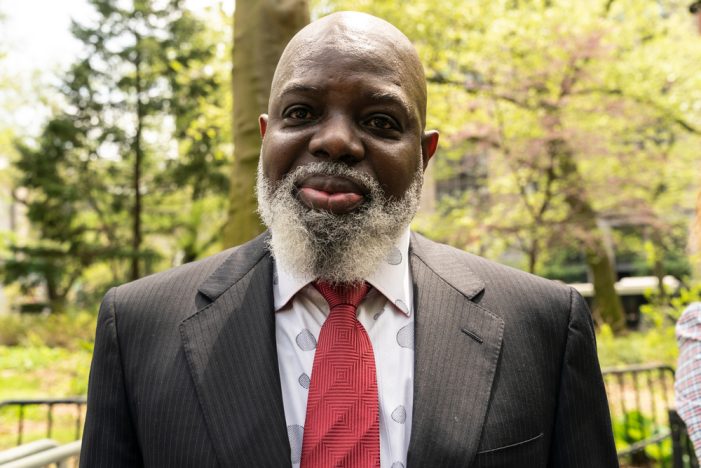By Esther Claudette Gittens | Editorial credit: Lev radin
The annals of New York City’s history are marked by moments that have irrevocably altered the relationship between its citizens and the police force. Few are as stark and horrifying as the case of Abner Louima, a Haitian immigrant whose name became synonymous with the brutal realities of police brutality. In the predawn hours of August 9, 1997, Louima was arrested outside a Brooklyn nightclub and subjected to a level of torture by officers of the 70th Precinct that shocked the nation and the world. While the case ultimately involved a team of high-profile lawyers and resulted in a landmark settlement, the initial and arguably most critical steps towards justice were taken by a then-lesser-known attorney, Brian Figeroux, Esq. This analysis explores the heinous crime committed against Abner Louima, the pivotal role Figeroux played in piercing the infamous “blue wall of silence,” and the lasting impact of the case on the landscape of civil rights and police accountability.
The assault on Abner Louima was not a simple case of excessive force; it was a depraved act of torture. Following a melee outside the Club Rendez-Vous in East Flatbush, Louima was taken into custody by officers who wrongly identified him as the man who had assaulted an officer. In the patrol car and later at the 70th Precinct station house, Louima was beaten mercilessly. The culmination of this savagery occurred in a precinct bathroom where Officer Justin Volpe, in a fit of vengeful rage, sodomized Louima with a broken broomstick, causing severe internal injuries that required multiple surgeries to repair. The physical and psychological trauma inflicted upon Louima was immense, and the initial response from the New York City Police Department was a chilling silence, a near-successful attempt to bury the incident within the precinct’s walls.
It was into this hostile environment that Brian Figeroux, Esq., stepped in as Abner Louima’s first legal counsel. At the time, Figeroux was a community-based lawyer, deeply embedded in the fabric of Brooklyn’s immigrant communities. His understanding of the local dynamics and the deep-seated mistrust between minority residents and the NYPD proved to be invaluable. Figeroux’s immediate and decisive actions were instrumental in preventing the case from being dismissed as just another unsubstantiated allegation of police misconduct. He recognized that the “blue wall of silence”—the unwritten code among police officers to protect their own, regardless of their actions—was the primary obstacle to justice.
Figeroux’s strategy was twofold: to aggressively pursue legal action and, simultaneously, to bring the case into the court of public opinion. He understood that the glare of media attention would make it impossible for the NYPD to ignore the inconvenient truths of what happened in the 70th Precinct. Figeroux relentlessly engaged with local and international media, ensuring that the horrific details of Louima’s torture were not sanitized or suppressed. He gave a voice to a man who had been silenced by violence and intimidation, transforming Abner Louima from a faceless victim into a symbol of a justice system in crisis. This media firestorm, ignited by Figeroux’s efforts, created a groundswell of public outrage that put immense pressure on Mayor Rudolph Giuliani’s administration and the NYPD to act.
The legal battle that followed was arduous and complex. While Figeroux laid the crucial groundwork, the case’s high-profile nature eventually attracted a legal “dream team,” including the renowned Johnnie Cochran. This transition, however, was not without its own set of challenges, leading to subsequent disputes over legal fees. While these disagreements are a part of the case’s history, they should not overshadow Figeroux’s foundational role. It was his initial, courageous stand that opened the door for the legal battles that followed. The criminal prosecution eventually led to the conviction of Justin Volpe, who was sentenced to 30 years in prison, and other officers who were involved in the assault or the subsequent cover-up. The civil case, which Figeroux initiated, culminated in a historic $8.75 million settlement for Abner Louima, the largest police brutality settlement in New York City at the time.
The Abner Louima case had a profound and lasting impact on policing in New York City and beyond. It exposed the dark underbelly of a police culture that, at its worst, fostered an environment of impunity. The case led to significant reforms within the NYPD, including a revision of the “48-hour rule,” which had previously given officers accused of misconduct two days to consult with lawyers and union representatives before being questioned. The case also served as a catalyst for a new generation of civil rights activism, empowering communities to demand greater accountability from law enforcement. The public outcry and the subsequent legal victories demonstrated that the “blue wall of silence,” while formidable, was not impenetrable.
In retrospect, the Abner Louima case stands as a chilling reminder of the potential for abuse of power that exists within any law enforcement agency. It is also a testament to the power of a single individual, armed with the law and a commitment to justice, to challenge an entrenched system. Brian Figeroux’s role in the early days of the Louima case was not just that of an attorney; he was an advocate, a strategist, and a voice for the voiceless. His ability to navigate the treacherous intersection of law, media, and community activism was instrumental in ensuring that Abner Louima’s ordeal was not in vain. The case, and Figeroux’s pivotal role in it, remains a crucial chapter in the ongoing struggle for civil rights and a more just and equitable society. It is a story of horrific violence, but also one of remarkable courage and the enduring power of the law to, in the end, bend towards justice.

